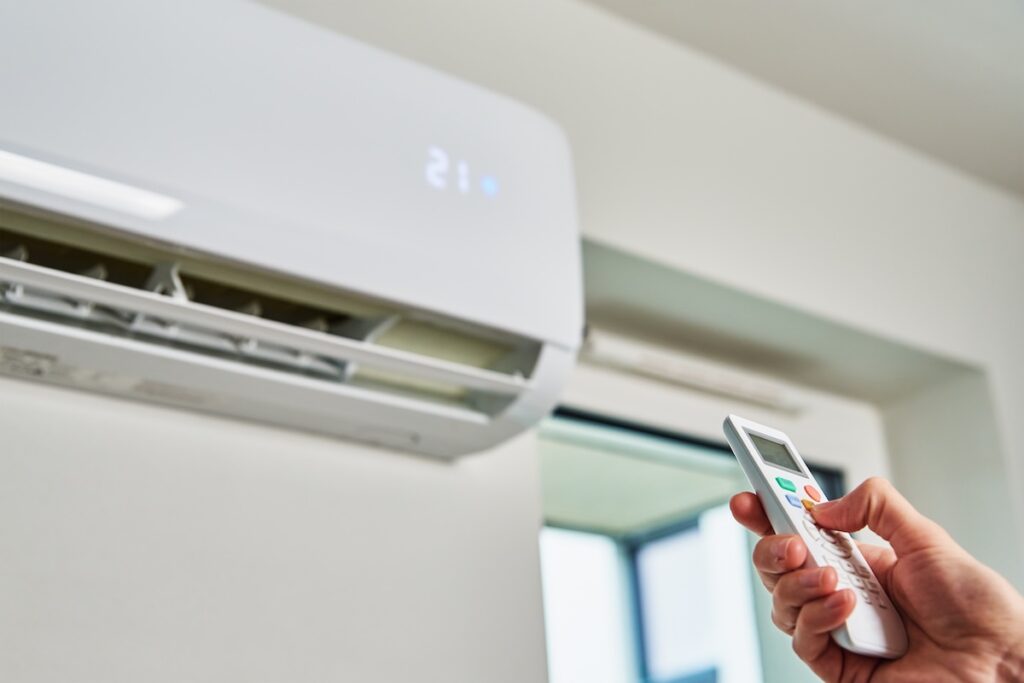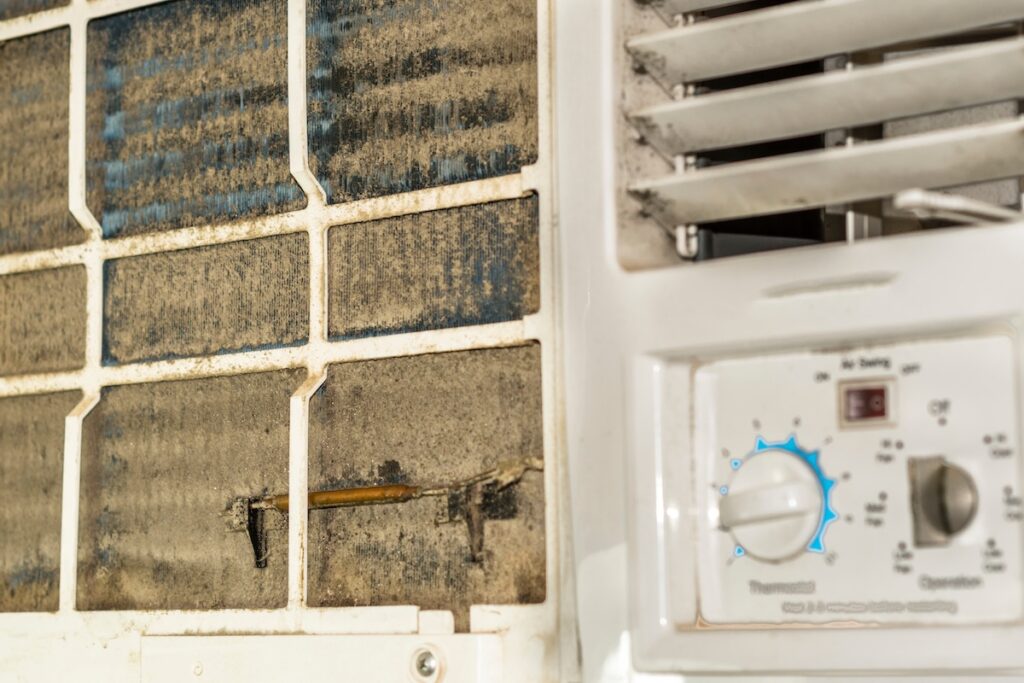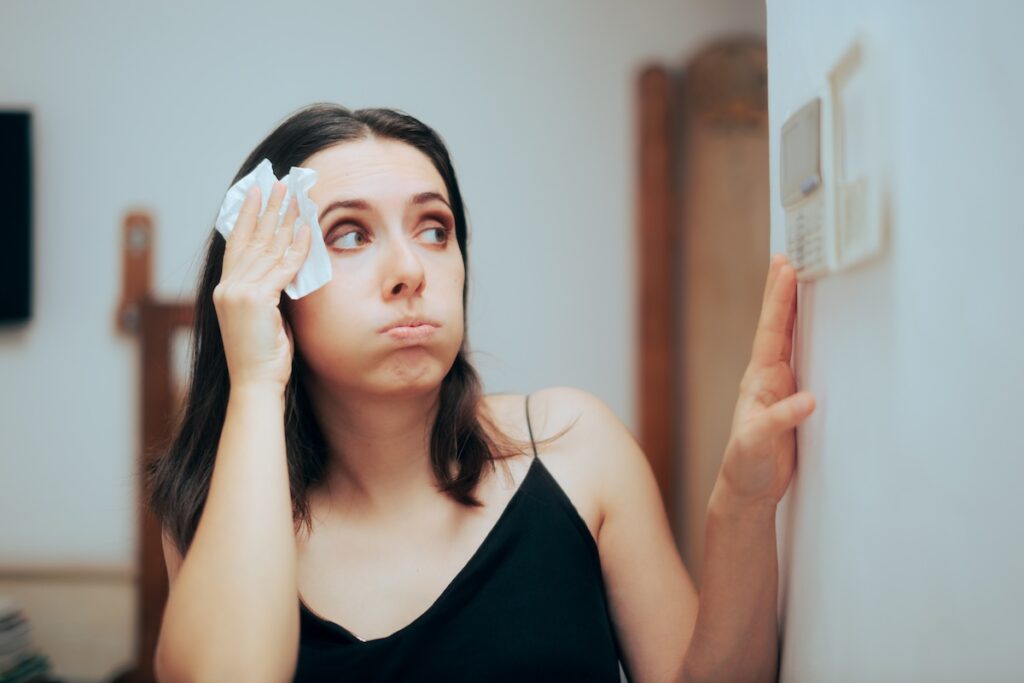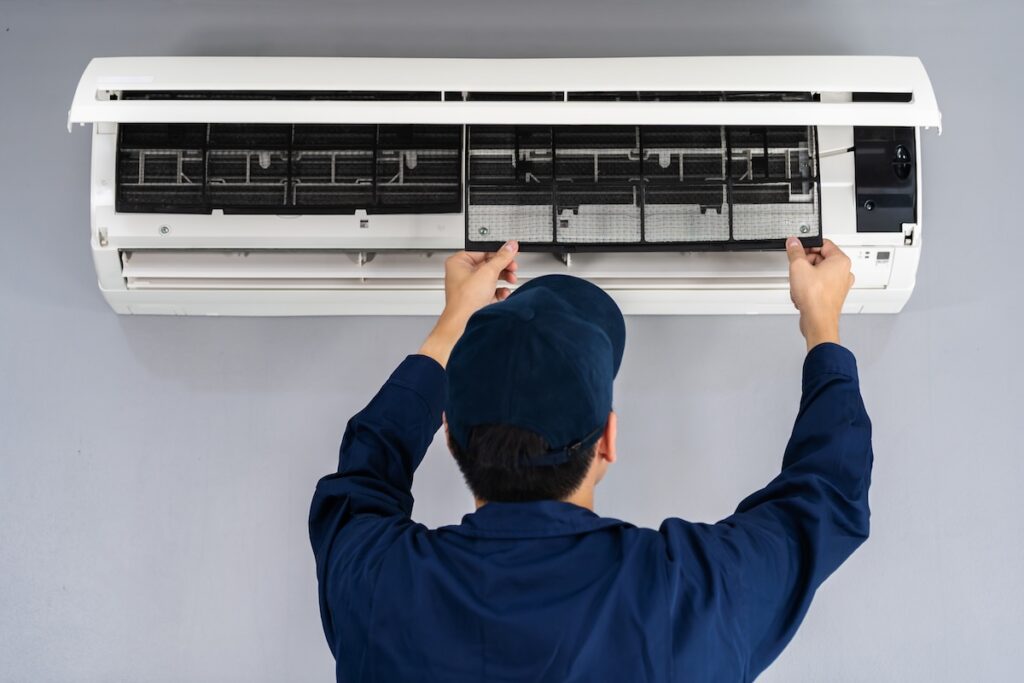AC Not Blowing Cold Air? (7 Reasons & Fixes)

When your AC is not blowing cold air during a sweltering summer day, it can quickly turn into more than just an inconvenience. Your home’s comfort depends on the performance of your air conditioning system, and knowing why your AC unit is producing hot air instead of cold can save you time and potentially expensive repairs.
Here are a few common reasons your HVAC unit might not be working at its best, along with actionable fixes:
- Clogged Filters: The most common cause of airflow issues.
- Low Refrigerant Levels: Essential for producing cold air.
- Dirty Coils: Blocks proper cooling and efficiency.
Throughout this blog, we’ll discuss these problems and more, so you know what steps to take when your air conditioning system runs into trouble.
Common Causes of AC Not Blowing Cold Air
Several things can cause your AC to stop cooling your home. Below, we’ve outlined the most frequent culprits and what you can do about them.
💨 Clogged Filters Block Airflow
Air filters play a vital role in ensuring your HVAC unit works efficiently. Over time, these filters trap dust, pollen, and debris, which can build up and block airflow. When filters are clogged, cool air struggles to pass through, leaving your AC blowing hot air or none at all.

How to Fix It:
- Inspect the Air Filter: Check your AC unit’s filters and look for visible dirt or clogs.
- Clean or Replace Filters: Most filters need cleaning every 1-3 months, especially during peak AC usage seasons.
- Regular Maintenance: Establish a filter replacement schedule to prevent ongoing issues.
Maintaining clean filters improves airflow, reduces strain on your system, and allows your AC to blow cold air efficiently.
📉 Low Refrigerant Levels
Refrigerant is the heart of your cooling system. It’s what absorbs heat from your home and releases it outside, leaving behind cool air. When refrigerant levels are low, your AC unit will struggle to produce the cold air needed to maintain a comfortable temperature.
Signs of Low Refrigerant:
- Warm air coming from vents.
- Hissing or bubbling sound near your AC unit.
- Ice buildup on refrigerant lines.
How to Fix It:
- Contact a Professional: Handling refrigerant requires specialized tools and expertise. A certified HVAC technician can inspect your system for leaks, recharge the refrigerant, and ensure your system is working properly.
Ignoring refrigerant issues can lead to long-term damage, so addressing this concern quickly is critical.
🌡️ Thermostat Not Set Correctly
Sometimes, the issue isn’t with the AC unit itself but rather with your thermostat. If the thermostat isn’t set correctly, your air conditioning system won’t provide the cold air you’re expecting.

How to Fix It:
- Check Temperature Settings: Ensure your thermostat is set to “Cool” and the temperature is lower than the actual room temperature.
- Inspect the Batteries: Dead or weak thermostat batteries can cause operational disruptions.
- Upgrade to a Smart Thermostat: Smart thermostats are more accurate and easier to control, reducing potential errors.
Troubleshooting the thermostat should be your first step when your HVAC isn’t cooling correctly.
❄️ Dirty or Frozen Evaporator Coils
Evaporator coils absorb heat to cool the air in your home, but dirt and grime buildup over time can reduce their efficiency. Alternatively, coils can freeze due to airflow issues or low refrigerant, causing your AC system to blow hot air instead of cold.
How to Fix It:
- Turn Off the AC: Allow frozen coils to thaw for several hours.
- Clean the Coils: Safely clean the coils using a specialized coil-cleaning agent or hire a technician for deep cleaning.
- Check for Airflow Issues: Dirty filters or blocked vents can exacerbate evaporator coil problems.
👉 Leaky Ductwork
Leaky or poorly insulated ducts can allow cool air to escape before it reaches your desired spaces, leaving your home feeling warmer than it should be.
How to Fix It:
- Inspect Ductwork: Look for gaps, holes, or loose connections.
- Seal Leaks: Use duct tape or masking tape to temporarily seal visible gaps. A professional can provide a more permanent fix by properly sealing and insulating your ducts.
Regular inspections of your duct system ensure cold air is delivered effectively throughout your home.
❌ Condenser Issues
The condenser, located outdoors, is responsible for expelling the heat your air conditioning system removes from your home. When this unit is blocked or malfunctioning, your entire system suffers.
How to Fix It:
- Clear Debris: Check the condenser for leaves, dirt, or other debris and remove them.
- Inspect for Damage: Look for bent fins or other visible issues.
- Professional Service: If clearing debris doesn’t help, schedule a technician to inspect the condenser unit.
Keeping the area around your condenser clean and clear will help ensure your AC runs smoothly.
💡 Electrical Issues or Tripped Circuit Breaker
Sometimes, electrical faults can cause your AC to stop blowing cold air altogether. A tripped circuit breaker can disrupt the power flow to your system.
How to Fix It:
- Check the Circuit Breaker: Locate your electrical panel and see if the breaker controlling your AC unit has tripped. Reset it if needed.
- Inspect Wiring: Damaged or frayed wires may require an electrician or HVAC specialist to resolve safely.
- Keep Electrical Components Safe: Electrical components should always be regularly inspected to prevent power-related issues.
What Else Could Cause the Issue?
While the above are the most common culprits, there are other minor problems worth a quick examination:
- Blocked Air Vents: Ensure furniture, curtains, or other items aren’t obstructing vents, which can prevent proper airflow.
- Incorrectly Sized AC Unit: An improperly sized HVAC unit won’t efficiently cool your home. Consult a technician to confirm you have the right system for your space.
- Fan Issues: The AC fans help move air through your ducts, but worn-out motors or blades can cause reduced performance. Call a professional to replace these components if necessary.

When to Call a Professional for Your AC Troubleshooting
While some issues can be resolved with simple fixes, others require professional expertise. For example:
- Refrigerant issues.
- Leaky ducts or damaged wiring.
- Major component failures like the compressor or condenser.
Attempting to DIY some of these repairs can be risky and may even void your warranty. Schedule an appointment with a trusted HVAC technician if you’re unsure.
Why Trust Monarch Heating and Cooling?
At Monarch Heating and Cooling, we understand how frustrating it is when your AC isn’t working properly on a hot day. Our team of licensed HVAC technicians has years of experience diagnosing and repairing air conditioning systems. From clogged filters to low refrigerant levels, we’ve seen it all and know exactly how to fix it.
Our Commitment to You:
- Prompt, reliable service that respects your schedule.
- Expert advice on maintaining your HVAC system for long-term performance.
Don’t spend another day battling hot air in your home. Trust Monarch Heating and Cooling to get your AC blowing cold air again. Contact us today for fast, professional service you can count on.
Need HVAC Service?
Contact the experts at Monarch Heating and Cooling.
Call us at (406) 213-8281!
